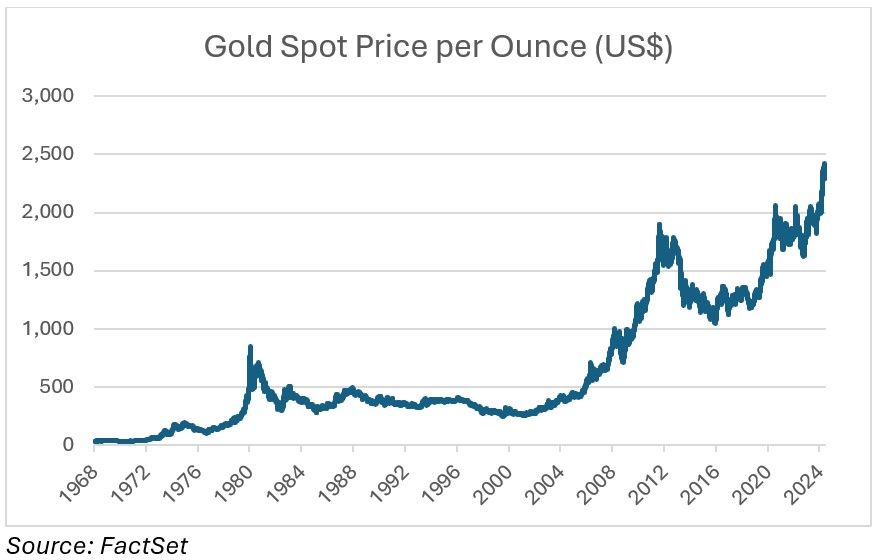Does Gold Belong in Your Retirement Plan?
There’s something sexy about a shiny gold bar, but should you go for the glitter? If you're tempted, a four-pronged investing approach could be best.


Profit and prosper with the best of Kiplinger's advice on investing, taxes, retirement, personal finance and much more. Delivered daily. Enter your email in the box and click Sign Me Up.
You are now subscribed
Your newsletter sign-up was successful
Want to add more newsletters?

Delivered daily
Kiplinger Today
Profit and prosper with the best of Kiplinger's advice on investing, taxes, retirement, personal finance and much more delivered daily. Smart money moves start here.

Sent five days a week
Kiplinger A Step Ahead
Get practical help to make better financial decisions in your everyday life, from spending to savings on top deals.

Delivered daily
Kiplinger Closing Bell
Get today's biggest financial and investing headlines delivered to your inbox every day the U.S. stock market is open.

Sent twice a week
Kiplinger Adviser Intel
Financial pros across the country share best practices and fresh tactics to preserve and grow your wealth.

Delivered weekly
Kiplinger Tax Tips
Trim your federal and state tax bills with practical tax-planning and tax-cutting strategies.

Sent twice a week
Kiplinger Retirement Tips
Your twice-a-week guide to planning and enjoying a financially secure and richly rewarding retirement

Sent bimonthly.
Kiplinger Adviser Angle
Insights for advisers, wealth managers and other financial professionals.

Sent twice a week
Kiplinger Investing Weekly
Your twice-a-week roundup of promising stocks, funds, companies and industries you should consider, ones you should avoid, and why.

Sent weekly for six weeks
Kiplinger Invest for Retirement
Your step-by-step six-part series on how to invest for retirement, from devising a successful strategy to exactly which investments to choose.
Gold has been in the headlines lately. Maybe you’ve noticed. I’m specifically talking about the shiny metal being sold by warehouse giant Costco. The bars are selling out within hours, if you can get them at all.
With so much enthusiasm around gold, it begs the question: Should gold be a part of your retirement plan?
Gold prices over the decades
It’s important to recognize how gold behaves. If you pull up a price chart that spans several decades, you’ll notice something. Gold has relatively short periods where it rockets up and then longer periods where it does nothing (or worse).
From just $107.88 $24.99 for Kiplinger Personal Finance
Become a smarter, better informed investor. Subscribe from just $107.88 $24.99, plus get up to 4 Special Issues

Sign up for Kiplinger’s Free Newsletters
Profit and prosper with the best of expert advice on investing, taxes, retirement, personal finance and more - straight to your e-mail.
Profit and prosper with the best of expert advice - straight to your e-mail.

If you’re an expert market timer, then you can obviously profit from buying during the uptrends and avoiding those long periods of underperformance. Unfortunately, during my time in this business, I’ve noticed something. There are very few investors who have even a remote shot at successfully timing the market. For most of us then, it’s the long term that we should concern ourselves with.
So how does gold do over the long term?
Here is one way to think about gold prices. Two hundred years ago, an ounce of gold could have afforded you one quality men’s suit. Today, that same ounce of gold will also buy you a high-quality men’s suit. In other words, it does a fantastic job of preserving purchasing power over the long term.
Physical gold has its plusses and minuses. There’s nothing quite like holding a bar of gold in your hand. And if we’re ever in some sort of doomsday scenario — the grid has collapsed, paper currency is worthless and so on, you’ll likely want your gold close at hand. Of course, hoarding coins and bars can make you a target for thieves. And since the IRS classifies physical gold as a collectible, you may be taxed at a steeper tax rate (currently as high as 28% on long-term gains) if you ever need to sell your gold.
Investing in gold without buying bars
Fortunately, there is more than one way to invest in gold. At SAM, we take a four-pronged approach. Part of that is owning physical gold, but there are three other categories that can benefit when the price of gold appreciates:
Major miners. Stocks of the largest companies that explore and produce gold, like Newmont Corp. (NEM) and Barrick Gold Corp. (GOLD), can be attractive at the right prices. They have operational leverage, meaning that while the price of gold rises, their costs stay the same, which can result in windfall profits when gold is a hot investment.
Emerging producers. This is the high-risk, high-reward part of the gold universe. Some of these companies don’t even produce gold. Rather, they are valued on their “pounds in the ground.” The lack of an operating history means these stocks carry greater uncertainty, but they can trade at a fraction of the value of their proven gold reserves.
Royalty companies. These are like banks for the mining industry. They provide capital to miners in exchange for a percentage of their production. Royalty companies have few employees and low overhead costs. When they’re not hunting for deals, they pretty much sit back and collect money. This superior business model has resulted in high profit margins and outstanding returns over time.
Is gold for you?
Whether you should own gold, how you should own it, and how much you should own ultimately depends on you and your financial goals. If capital preservation over the long term is a top priority for you, that argues for a larger allocation. But if you are growth- or income-driven, perhaps a small bit of exposure makes more sense for you. This sort of planning can be done on your own or with the assistance of a financial adviser.
Just know that if Costco is yet again out of stock or limits how many gold bars you can buy, you have many other options.
Related Content
- Disgusted With Your Savings Interest Rate? Time to Switch
- How to Find the Best Gold Stocks
- Why You Shouldn’t Ignore Investing in Commodities
- The Best Gold ETFs With Low Costs
- Why I Still Won't Buy Gold: Glassman
Profit and prosper with the best of Kiplinger's advice on investing, taxes, retirement, personal finance and much more. Delivered daily. Enter your email in the box and click Sign Me Up.

Michael is a Portfolio Manager and Deputy Chief Investment Officer at SAM, a Registered Investment Advisor with the United States Securities and Exchange Commission. File number: 801-107061. He sources investment opportunities and conducts ongoing due diligence across SAM’s portfolios. Michael co-manages SAM’s Income and Tactical Select strategies. Prior to joining SAM, Michael worked with high-net-worth private clients for the largest independent wealth management firm in the United States. He was also a senior analyst for one of the largest investment-grade bond managers in America. Michael joined SAM in 2017.
-
 Dow Adds 1,206 Points to Top 50,000: Stock Market Today
Dow Adds 1,206 Points to Top 50,000: Stock Market TodayThe S&P 500 and Nasdaq also had strong finishes to a volatile week, with beaten-down tech stocks outperforming.
-
 Ask the Tax Editor: Federal Income Tax Deductions
Ask the Tax Editor: Federal Income Tax DeductionsAsk the Editor In this week's Ask the Editor Q&A, Joy Taylor answers questions on federal income tax deductions
-
 States With No-Fault Car Insurance Laws (and How No-Fault Car Insurance Works)
States With No-Fault Car Insurance Laws (and How No-Fault Car Insurance Works)A breakdown of the confusing rules around no-fault car insurance in every state where it exists.
-
 For the 2% Club, the Guardrails Approach and the 4% Rule Do Not Work: Here's What Works Instead
For the 2% Club, the Guardrails Approach and the 4% Rule Do Not Work: Here's What Works InsteadFor retirees with a pension, traditional withdrawal rules could be too restrictive. You need a tailored income plan that is much more flexible and realistic.
-
 Retiring Next Year? Now Is the Time to Start Designing What Your Retirement Will Look Like
Retiring Next Year? Now Is the Time to Start Designing What Your Retirement Will Look LikeThis is when you should be shifting your focus from growing your portfolio to designing an income and tax strategy that aligns your resources with your purpose.
-
 I'm a Financial Planner: This Layered Approach for Your Retirement Money Can Help Lower Your Stress
I'm a Financial Planner: This Layered Approach for Your Retirement Money Can Help Lower Your StressTo be confident about retirement, consider building a safety net by dividing assets into distinct layers and establishing a regular review process. Here's how.
-
 The 4 Estate Planning Documents Every High-Net-Worth Family Needs (Not Just a Will)
The 4 Estate Planning Documents Every High-Net-Worth Family Needs (Not Just a Will)The key to successful estate planning for HNW families isn't just drafting these four documents, but ensuring they're current and immediately accessible.
-
 Love and Legacy: What Couples Rarely Talk About (But Should)
Love and Legacy: What Couples Rarely Talk About (But Should)Couples who talk openly about finances, including estate planning, are more likely to head into retirement joyfully. How can you get the conversation going?
-
 How to Get the Fair Value for Your Shares When You Are in the Minority Vote on a Sale of Substantially All Corporate Assets
How to Get the Fair Value for Your Shares When You Are in the Minority Vote on a Sale of Substantially All Corporate AssetsWhen a sale of substantially all corporate assets is approved by majority vote, shareholders on the losing side of the vote should understand their rights.
-
 How to Add a Pet Trust to Your Estate Plan: Don't Leave Your Best Friend to Chance
How to Add a Pet Trust to Your Estate Plan: Don't Leave Your Best Friend to ChanceAdding a pet trust to your estate plan can ensure your pets are properly looked after when you're no longer able to care for them. This is how to go about it.
-
 Want to Avoid Leaving Chaos in Your Wake? Don't Leave Behind an Outdated Estate Plan
Want to Avoid Leaving Chaos in Your Wake? Don't Leave Behind an Outdated Estate PlanAn outdated or incomplete estate plan could cause confusion for those handling your affairs at a difficult time. This guide highlights what to update and when.